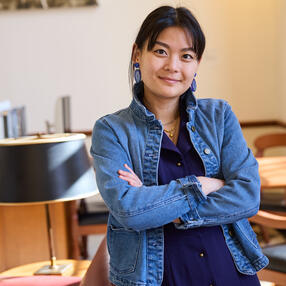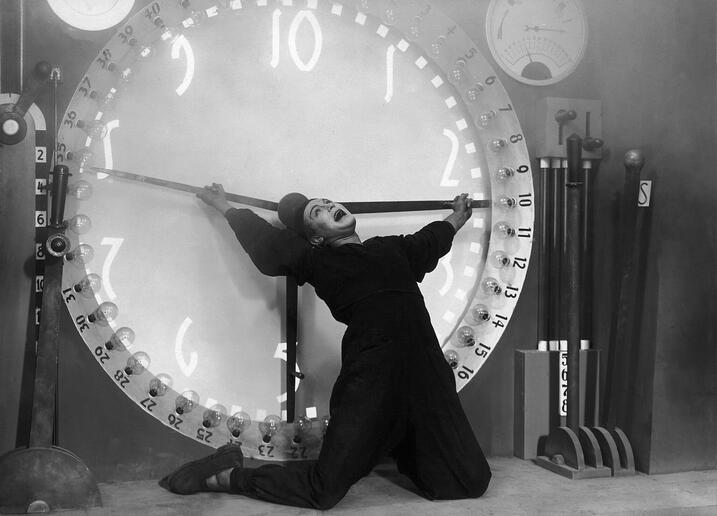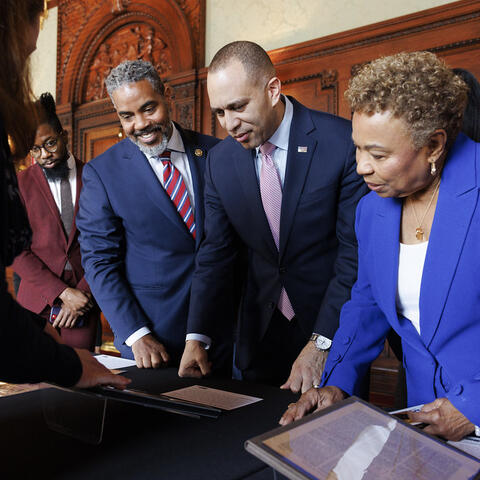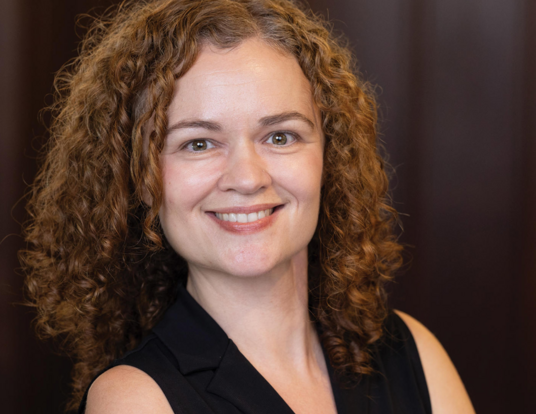Rewriting Exhaustion
How the concept of industrial fatigue went from a condition of the body to one of the mind

Research at Risk: Since World War II, universities have worked with the federal government to create an innovation ecosystem that has yielded life-changing progress. Now much of that work may be halted as funding is withdrawn. Find out more about the threats to medical, engineering, and scientific research, as well as how Harvard is fighting to preserve this work—and the University's core values.
As a member of the "people operations" (human resources) staff at Google in the mid-2010s, Tina Wei was struck by how many perks employees received in the office: door-to-door shuttle service to work, fitness classes, massages, and pantries stocked with snacks, to name just a few. The company even offered a meditation program—with its own branding worked in.
“They had a really famous mindfulness workshop that started when the company was founded called Search Inside Yourself,” she says. “It reflected the company’s main product—the Google.com search engine.”
Wei’s professional experiences—both at Google and today at the Harvard Trade Union Program (HTUP)—inspire her PhD research at Harvard Griffin GSAS on the history of workplace fatigue. As one of the School’s 2024 Harvard Horizons scholars, Wei presents this work in her project, “Ameliorating Fatigue at Work: Workplace-Management, Mind-Body Medicine, and Self-Help for Industrial Fatigue in the U.S., 1900-1950,” focusing on the evolution of how burnout was understood and addressed in the US during the first half of the twentieth century.
The History of a Modern Problem
In an era of constant digital connection, work can easily occupy our attention after hours. The spread of flexible hybrid and remote work arrangements in the wake of the COVID-19 pandemic, furthermore, has made it even more challenging to fully disconnect from our jobs. Perhaps it’s no wonder, then, that our colleagues and friends often tell us they’re tired.
But do we actually know what workplace fatigue is? Wei’s extensive historical research on the topic has led her to question existing assumptions about what fatigue has meant to workers, employers, and scientists over the course of history.
“Scholars often take for granted that definitions of conditions like stress, fatigue, and burnout are fairly stable,” she explains. “My research, by contrast, investigates the contested meanings of fatigue, showing how different scientific subdisciplines identified different kinds of fatigue in the human worker.”

Wei’s dissertation advisor, Harvard College Professor and A. Bernard Ackerman Professor of the Culture of Medicine Professor David S. Jones, notes that the student’s work adds historical context to a problem that has become hugely important in workplaces nationwide today— employee burnout. “While this feels like a very modern problem, workers, business leaders, and researchers in many fields became concerned about the problem a century ago,” he says.
Against a backdrop of widespread union membership and notable labor uprisings in the early twentieth century, workplace dissatisfaction in the US became a pressing issue for employers––and for scientific research. However, as Wei explains, researchers in different fields arrived at varying ways of dealing with the problem of worker fatigue. “One way to think about fatigue was to compare a worker to a machine,” as some medical researchers did, Wei explains. One study, she says, involved measuring how much time a laborer could spend in a hot furnace before collapsing, and then running medical assays on the worker’s bodily fluids to try to understand the processes at play. “Some of these physiologists looked at fatigue as a question of how much you can push this worker-machine until it just totally stops being able to do any more work,” Wei says.
As the years passed, however, researchers increasingly framed worker fatigue as a problem of the mind. According to Wei, one extreme example was E. E. Southard, Bullard Professor of Neuropathology at Harvard Medical School, who claimed that workers agitating for improved work conditions were mentally ill. “They were psychopaths, in his terms, who should receive treatment in the Boston Psychopathic Hospital, for which he was director,” explains Wei.
These contrasting ways of understanding fatigue also had philosophical and human consequences. “Over time, the goal shifted from a desire to preserve worker health to devising schemes to better control the workforce,” says Jones. While physiological research on bodily fatigue was used to support calls for better protections of laborers’ safety, views of fatigue as a mental issue gave employers an excuse to avoid investing in improvements to working conditions.
“When workers claimed they were experiencing fatigue––and raising all these other labor issues over wages, hours, and accidents in the workplace––some researchers claimed that something was wrong with their minds,” Wei says. “Instead of addressing the material problem with a material solution, employers said, ‘Oh, the problem is that you’re dissatisfied at work. So, we can give you more meaning, or acknowledgment.’”
Inspiration from Experience
Flash forward sixty years to Wei’s time at Google. She remembers the company’s investment in collecting information on workplace morale among employees, which sparked her curiosity about what criteria and definitions might be at play in reaching “data-driven” insights about managing workers. “I was fascinated by how they collected data,” she remembers, “because they tracked employee satisfaction, and there can be hundreds of ways to break that down. What metrics were they using?”
While Google’s workplace wellness initiatives did represent a massive financial investment in employee benefits, critics claimed that they also played a role in blurring work-life boundaries and motivating workers to put in longer hours in the office. “I think that tension often appears because the end goal is often to increase productivity,” Wei says. “And I think the larger question, whether you’re approaching it from a worker, management, or even a societal perspective is, ‘How do you stay healthy in capitalism?’ With all this pressure arising from how work and production are structured, what do physiological and psychological health look like in capitalism? And how do you pursue that?”

Wei’s faculty advisors say her research has present-day relevance. “Tina Wei is bringing a whole new dimension to the subject of how workers in the United States in the first half of the twentieth century adapted—or not—to the demands of a workplace increasingly dominated by mass production,” says Harvard University Distinguished Service Professor and Howard Mumford Jones Professor of American Studies Lizbeth Cohen, a member of Wei’s dissertation committee. “By framing the issue [of workplace fatigue] as a topic in medical history, she is shedding light on how crucial players in that transition—workers, their employers, union leaders, reformers, and government officials—understood the limits and possibilities of the human body at work.” Jones adds, “The lessons that Tina draws from history are sure to draw attention today.”
Wei’s research is already having a real-world impact. As a program assistant at the HTUP, she shares her work with a broader audience, simultaneously gaining valuable insight into the social and personal histories surrounding US labor activism. “In the Harvard Trade Union Program,” Wei says, “they’ve been very kind to invite me to lecture. So, I have been able to share with the union leaders some findings from my research and teaching.”
Wei says she hopes her research can help people think more critically about how science impacts our work experience and how we define fatigue and related conditions. “What is the history of the concepts and conditions that seem familiar and pervasive to us today?” she asks. “The insights of historical research show the contingencies and accidents that shaped our world today. As historians often say, studying the past sometimes allows us to better see the present, identify the roads not taken, and envision bolder futures.”
Learn more about the 2024 Harvard Horizons Scholars and see them on stage at the campus-wide Harvard Horizons Symposium in Sanders Theatre on April 9.
Get the Latest Updates
Join Our Newsletter
Subscribe to Colloquy Podcast
Simplecast



